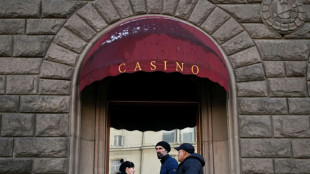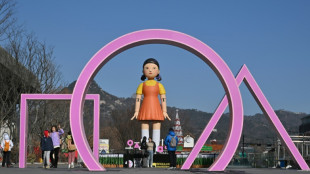
-
 Markets rise after Trump AI pledge but China tariff fears return
Markets rise after Trump AI pledge but China tariff fears return
-
'Did not push hard enough': Navalny lawyer speaks of regrets

-
 Bulgaria court ruling turns spotlight on gambling addiction
Bulgaria court ruling turns spotlight on gambling addiction
-
Inoue focused on Korean with bright lights of Vegas on horizon

-
 Mauricio Funes: journalist turned El Salvador president
Mauricio Funes: journalist turned El Salvador president
-
Navarro urges rule change after double-bounce furore in Melbourne

-
 Asian traders cheer Trump AI pledge but China tariff woes return
Asian traders cheer Trump AI pledge but China tariff woes return
-
Lesotho's king pitches green energy to Davos elites

-
 Buttler rejects calls for England to boycott Afghanistan match
Buttler rejects calls for England to boycott Afghanistan match
-
'I believe': Swiatek surges into Australian Open semi with Keys

-
 Indonesia rescuers search for survivors as landslide kills 19
Indonesia rescuers search for survivors as landslide kills 19
-
Triple-doubles for Jokic and James fuel lopsided NBA wins

-
 Five things about the 2025 World Rally Championship
Five things about the 2025 World Rally Championship
-
'Love for humanity': Low-crime Japan's unpaid parole officers

-
 Indonesia rescuers search for survivors as landslide kills at least 17
Indonesia rescuers search for survivors as landslide kills at least 17
-
Trump targets opponents, faces criticism from cathedral pulpit

-
 S. Korea to overhaul some airports after Jeju Air crash
S. Korea to overhaul some airports after Jeju Air crash
-
Resilient Keys 'really proud' to be back in Melbourne semis

-
 Bloodied Welsford fights back from crash to win another Tour stage
Bloodied Welsford fights back from crash to win another Tour stage
-
Swiatek sweeps into Melbourne semis, Sinner faces home test

-
 Rampant Swiatek sweeps into Australian Open semi-final with Keys
Rampant Swiatek sweeps into Australian Open semi-final with Keys
-
Lanterns light up southern Chinese city ahead of Lunar New Year

-
 'Worst ever' Man Utd turn to Europa League as saving grace
'Worst ever' Man Utd turn to Europa League as saving grace
-
Brazil saw 79% jump in area burned by fires in 2024: monitor

-
 Resilient Keys beats Svitolina to reach Australian Open semi-finals
Resilient Keys beats Svitolina to reach Australian Open semi-finals
-
Most Asian markets rise after Trump AI pledge but China tariff woes return

-
 Djokovic mentally ready for Zverev but worried about creaking body
Djokovic mentally ready for Zverev but worried about creaking body
-
As Trump takes aim at EVs, how far will rollback go?

-
 No home, no insurance: The double hit from Los Angeles fires
No home, no insurance: The double hit from Los Angeles fires
-
Trump targets opponents, faces criticism from catherdral pulpit

-
 Ichiro becomes first Japanese player elected to MLB Hall of Fame
Ichiro becomes first Japanese player elected to MLB Hall of Fame
-
Relentless Swiatek, dizzy Sinner eye Australian Open semi-finals

-
 Colombian forces edge into guerrilla strongholds
Colombian forces edge into guerrilla strongholds
-
Netflix reports surge in subscribers, new price hikes

-
 Panama complains to UN over Trump canal threat, starts audit
Panama complains to UN over Trump canal threat, starts audit
-
Rubio, on first day, warns China with Asian partners

-
 Ichiro, the Japanese Hall of Famer who helped redefine baseball
Ichiro, the Japanese Hall of Famer who helped redefine baseball
-
Ichiro becomes first Japanese elected to MLB Hall of Fame

-
 Borussia Dortmund and Nuri Sahin End Their Collaboration
Borussia Dortmund and Nuri Sahin End Their Collaboration
-
ZeroPath Corp. Launches Next-Generation Code Security Platform Powered by Artificial Intelligence

-
 Guardian Metal Resources PLC Announces Presidential Executive Order
Guardian Metal Resources PLC Announces Presidential Executive Order
-
Cashmere Valley Bank Reports Annual Earnings of $28.2 Million and Increases Semi-Annual Dividend

-
 Pantheon Resources PLC Announces Preliminary Log, Core and Cuttings Analysis
Pantheon Resources PLC Announces Preliminary Log, Core and Cuttings Analysis
-
Evotec Receives Grant from Korean Government to Develop Novel Antibody-based Treatments for Lung Diseases

-
 Relief Therapeutics Completes Strategic Transition with Sale of GOLIKE Rights ex-US
Relief Therapeutics Completes Strategic Transition with Sale of GOLIKE Rights ex-US
-
Xebra Brands Announces Non-Brokered Private Placement and Concurrent Debt Settlement

-
 Rare snow socks New Orleans as Arctic blast chills much of US
Rare snow socks New Orleans as Arctic blast chills much of US
-
Liverpool clinch Champions League last-16 berth, Barcelona win epic

-
 Partner demands release of Argentine officer held for 'terrorism' in Venezuela
Partner demands release of Argentine officer held for 'terrorism' in Venezuela
-
Sad clown: 'Joker 2,' Phoenix and Gaga nominated for Razzies


'Love for humanity': Low-crime Japan's unpaid parole officers
Teruko Nakazawa once intervened in a knife fight between an ex-offender and their mother -- all in a day's unpaid work for Japan's army of volunteer probation officers.
The 83-year-old, who jokes she is a "punk" as she puffs on a cigarette, devoted decades to supervising and helping rehabilitate convicted criminals on parole.
But she did not take a single yen for her hard work under a long-running but little-known state scheme that some say contributes to the nation's famously low crime rate.
Around 47,000citizen volunteers known as "hogoshi" far outnumber the 1,000 salaried probation officers in Japan.
"I never wanted to be thanked or rewarded," said Nakazawa, recalling once going to save a boy "surrounded by 30, 40 bad guys".
"I did what I did because I wanted to," she told AFP. "You can't help but try to put out a fire when you spot one, right?"
But the altruistic programme faces an uncertain future, with around 80 percent of hogoshi aged 60 or over.
The recent murder of a hogoshi by a parolee has also rattled the trust in ex-offenders' good nature underlying the system.
For one of Nakazawa's former charges, "she was like a grandma".
"I wouldn't dare do anything bad on her watch," he said, declining to be named because he hides his criminal past.
"I was scared of ever feeling guilty that I had betrayed her."
The 34-year-old said Nakazawa "helped me a great deal" -- especially to apologise to his victims.
- Stabbing -
A 60-year-old hogoshi was fatally stabbed in Otsu, near Kyoto, by a man under his supervision in May.
The incident raised fears that potential hogoshi -- who may already be wary of parolees whose crimes include theft, sex offences and sometimes murder -- could be scared away.
Hogoshi have historically rejected proposals to be paid a regular wage.
This is because their activity is "a symbol of selflessness" rooted in "love for humanity", legal experts said in an October report.
Only some of their expenses are covered, and they must pay a yearly registration fee -- another factor blamed for the struggle to attract younger volunteers.
Still, Japan "would be a different country without hogoshi", said Carol Lawson, a comparative criminal justice professor at the University of Tokyo, citing the nation's "extraordinary lack of post-war crime".
The system's high "tolerance of risk" is unusual, she said. Hogoshi often invite parolees to their homes to develop a warm, familiar relationship.
Countries such as the Philippines, Thailand and Kenya have made use of Japan's expertise to introduce similar systems.
But "it's hard to even imagine the hogoshi system gaining any traction" in Anglo-American jurisdictions with a more "retributive" mindset Lawson told AFP.
- 'OK to exist' -
Nakazawa said her daughter used to worry about her safety and would have urged her to quit had the Otsu homicide occurred before her retirement in 2018.
But if society shuns ex-offenders, "they will only proliferate and commit even more heinous crimes," she said.
"We have to root for them so they won't reoffend."
Hogoshi often recruit other hogoshi based on criteria such as reputability, stable income and sufficient free time.
Mieko Kami, a 74-year-old Tokyo flower arrangement teacher, had no experience with criminals before joining the scheme.
When first approached, "I thought, 'there's no way I can do this'", Kami told AFP.
But after three years she changed her mind and was soon sipping tea with a yakuza gangster, helping a young man in a squalid apartment and hurrying at night to a blood-soaked suicide attempt.
"Learning about their upbringing sometimes makes me think it's inevitable they turned out this way," Kami said.
"I feel they want to be assured it's OK to exist," she said, describing herself as "sometimes being their mother".
"So I praise, acknowledge them... I feel fond of them."
- 'Good listener' -
Currently on parole in Osaka, Ueko, who only gave his nickname, recalls taking illegal drugs "to be set free of my painful life" trying to fit in as a gay person in Japan.
Initially, his hogoshi's life seemed so impeccable "I doubted he could possibly understand the feelings of us ex-prisoners," the 47-year-old told AFP at drug rehab centre DARC.
But now "he's a very good listener for me".
It is not uncommon for parolees to skip their twice-monthly appointments with hogoshi and fail to bond.
Still, Nakazawa's once-rowdy charges sometimes visit her cafe for tearful reunions, or phone her asking about her health.
"They even jokingly tell me, 'don't mess around', which is exactly what I used to tell them!" Nakazawa laughed.
"I spent my whole life caring about other people. But now I'm old and getting weak, they're caring about me."
"They're my hogoshi now."
O.Karlsson--AMWN